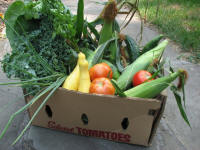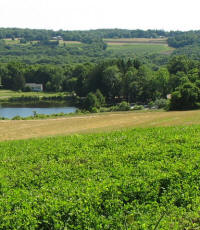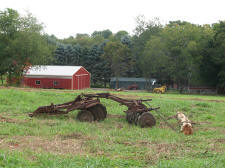Conservation Commission
Shelton, Connecticut
Our Blogs & Groups:
- Trails Committee Blog
- Eklund Garden Page
- Eklund Garden Blog
- CC Google Group
- Deer Committee Blog
- Litter Committee Blog
- "In the Field" Blog
- Facebook Page

Shelton Land Trust
The Shelton Land Conservation Trust is a private organization often confused with the Conservation Commission. The Land Trust owns 364 acres of private open space that is open to the public, including several trails and a youth camp.
Links
- Shelton Land Trust
- City of Shelton
- Litter Committee
- Ansonia Nature Ctr
- CT Forest & Parks
- Housatonic Valley
Contact
Teresa Gallagher
Natural Resource Manager
(203) 924-1555 x1315
City of Shelton
54 Hill Street
Shelton, CT 06484
(email)
Natural Resource Manager Teresa Gallagher's office is located in Room 102 of City Hall (adjacent to the auditorium). If you need to meet with her, please call first to make sure she will be at her desk.
Pick-Your-Own Farms
Bare Plain Farm (Christmas Trees)
Beardsley
Cider Mill & Orchards (apples)
Fairview Tree Farm
(Christmas Trees)
Jones Family Farm (Christmas Trees, strawberries, blueberries, pumpkins)
Wine Tasting
Ice Cream Shop
Haunted Hay Rides
Fairview Tree Farm(trees, gifts)
Parties
Scout Badge Activities
Organic Produce
Community Supported Agriculture (CSA)
Stone Gardens Farm (full shares & half shares)
Onsite Retail
Shelton Farmer's Market (downtown Shelton)
Beardsley Cider Mill & Orchards (apples, pies, cider, gifts)
Birdseye Sugar Grove (maple syrup, tours, gifts)
East Village Farm (eggs, gifts)
Fairview Tree Farm(trees, gifts)
Guy's Eco Garden(produce)
Hubbell Farm (gifts, wool products)
Jones Family Farm (Christmas Trees, strawberries, blueberries, pumpkins, wine, gifts)
Stone Gardens Farm(large vegetable stand)
Wells Hollow Creamery (ice cream, produce, flowers, hay, Christmas Trees)
Farmland in Shelton
The White Hills of Shelton owe their scenic nature in large part to
the concentration of family farms nestled in the hills.
This quiet corner of Fairfield County draws "agri-tourists" from
as far away New York City and New Jersey to cut their own
Christmas trees, pick their own produce, or visit the local
winery.
|
Candy Cane Hill offers panoramic vistas at Jones Family Farm. |
Jones Family Farm and Beardsley Cider Mill & Orchards are perhaps best known regionally, but many local residents frequent smaller farms such as Fairview Tree Farm, East Village Farm, Guy's Eco Garden, Stone Gardens Farm, and Hubbell Farm. Other farms produce hay, corn, cattle, or lease out their land to neighboring farms.
There are family farms located elsewhere in Shelton as well, such as Bare Plain Farm and Well's Hollow Creamery, which have been in the family for many generations. The latter takes advantage of the busy Bridgeport Avenue commercial corridor.
Farmland Preservation Program
 A
weekly share from
Stone Gardens Farm's CSA program. A
weekly share from
Stone Gardens Farm's CSA program. |
Shelton's Farmland Preservation Program is detailed in the 2009 Open Space Plan. In a nutshell, farmers need both farmland and economic viability to be successful. Farms that cannot generate an economical product, or find capital for farmland investment, or farms that are overly restricted by zoning ordinances, may fail. And high land values may induce farmers to sell their land to developers until there is no land left to farm. Our goal is to enhance both the viability of farms and the preservation of farmland.
Shelton's proximity to millions of affluent consumers means it is ideally suited for agritourism, such as pick-your-own crops and haunted hayrides. The scenic, semi-rural ambiance of the White Hills is a major draw for regional tourists. Therefore, viability of farming in the White Hills depends, in part, on preservation of the rural character.
Purchase of Development Rights
 Shelton Family Farm (foreground) and Jones Family Farm (background) are protected by agricultural easements. |
Arguably the most important tool for preserving farmland is the "purchase of development rights" (or "PDR"), which consists of buying an agricultural conservation easement over the property that allows farming activities but prohibits housing developments. The program is completely voluntary. The farmer continues to fully own and operate the farm, but gains funding for farmland investments or other needs.
Shelton has purchased the development right to 411 acres of farmland in the White Hills, including Jones Family Farm (Pumpkinseed Hill, Valley Farm, and Homestead Acres), Shelton Family Farm, Stockmal Woods, Beardsley Organic Farm, and Little Knoll.
This type of private open space has several important advantages for taxpayers. First, when farms are replaced by housing tracts, the cost of the services required by the new residents is substantially greater than the new taxes they pay. This increases the tax rate. Farmland, on the other hand, requires very little of city services and a typical farm pays more in taxes than they generate in services. Therefore, in the long run, it is more cost effective for taxpayers to buy development rights than to allow farmland to be subdivided.
We are sometimes asked why the City does not simply purchase the farmland outright so there is full ownership and public access. The City has in fact purchased several properties with hayfields on them, for which the existing farmer tending the hay is given an annual license to continue haying the property (Wiacek, Tall, Klapick, and French's Hill farms). However, municipalities are not well suited to operate and maintain more complex farms, which involves substantial effort, money, and skill.
 French's Hill and Hubbell Farm |
Although these lands are not accessible to the public in a traditional sense, in some cases they may actually be visited more often than our typical public open space properties. Many people pick berries or cut trees on the Jones property, for example, even though that land is not "public" open space.
Why the City should purchase development rights if there are no immediate plans to subdivide the property? Unfortunately, once there are plans to sell or subdivide the property, it is probably too late to purchase the development rights. And farms that seem secure for the moment are always vulnerable to market downturns, illness in the family, or other unexpected hardships that necessitate a quick sale of the property. It is more cost effective to acquire development rights from a willing farmer, especially if the farmer is amenable to "gifting" a portion of the assessed value to the City, than to buy the land later from a developer after it has been subdivided.